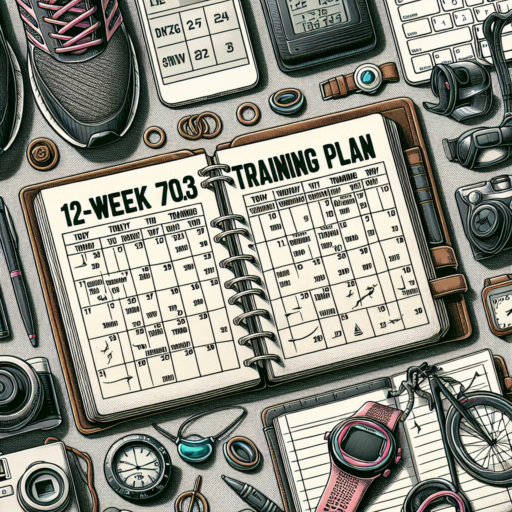Can I train for a half Ironman in 12 weeks?
Embarking on the journey to a half Ironman requires dedication, a structured training plan, and, most importantly, time. But what if time is not on your side? Many aspiring triathletes ponder over the feasibility of preparing for such an endeavor in a mere 12 weeks. Let’s delve into what such a compact training timeline entails.
Understanding the Foundations
Before considering a 12-week plan, it’s crucial to assess your current fitness level. Training for a half Ironman, which comprises a 1.2-mile swim, 56-mile bike ride, and a 13.1-mile run, demands a solid base in all three disciplines. If you’re starting from scratch, this timeframe might be challenging. However, for those with a decent foundation in swimming, cycling, and running, 12 weeks could be just enough to prepare adequately, especially if you can commit to a rigorous and well-structured training schedule.
Key Components of a 12-week Training Plan
A typical 12-week training plan for a half Ironman would involve a meticulous blend of endurance training, speed work, and recovery. Your weekly regimen should incorporate at least two sessions per discipline, gradually increasing in intensity and duration. Integrating brick sessions—back-to-back workouts combining two disciplines—is essential to acclimate your body to the transitions between swimming, biking, and running. Equally important is the inclusion of strength training to build muscle resilience and injury prevention exercises.
The feasibility of training for a half Ironman in 12 weeks is not merely a yes or no question. It largely depends on your current fitness level, your commitment to the training, and your personal goals for the race. With focused effort and a strategic approach, it’s indeed possible to cross the finish line of a half Ironman within such a condensed preparation period.
Can you train for a half Ironman in 3 months?
Embarking on the journey to complete a half Ironman is an ambitious goal, especially when faced with a tight timeline of just 3 months. The answer to whether this is feasible heavily depends on your current fitness level, previous experience in long-distance triathlons, and your commitment to a rigorous training schedule. Training for a half Ironman, which includes a 1.9km swim, a 90km bike ride, and a 21.1km run, requires not only physical endurance but also mental resilience.
To kickstart this intense training period, athletes should focus on building a solid base in all three disciplines. This means consistent swimming, cycling, and running sessions each week, gradually increasing in both intensity and volume. For those starting from a relatively high level of fitness, the 3-month timeframe might be just enough to prepare adequately, albeit with dedication and perhaps some guidance from experienced coaches or training programs.
Furthermore, incorporating strength and flexibility training into your regimen is crucial. These sessions help to prevent injuries, which could otherwise derail your training plans. Balancing these workouts with enough rest and recovery is also a key component of a successful half Ironman training plan. Nutrition plays a significant role as well, as fueling your body correctly will enhance your performance and recovery throughout this challenging period.
How to structure 70.3 training?
Creating an effective training plan for a 70.3-distance triathlon, which involves a 1.2-mile swim, a 56-mile bike ride, and a 13.1-mile run, requires a balanced approach that builds endurance, strength, and speed while also including adequate recovery time. Understanding how to structure 70.3 training is crucial for athletes aiming to complete this challenging distance successfully.
Initially, segment your training into phases, typically beginning with base building, followed by increasing intensity and volume, and then tapering in the weeks leading up to the race. A common strategy includes focusing on one discipline each day, allowing for adequate recovery and minimizing the risk of injury. Emphasizing consistency over extreme distances or speed in early training is essential to build a solid foundation.
Incorporate brick workouts, which combine two disciplines back-to-back (most commonly bike and run), to prepare for the unique challenges of transition during race day. Additionally, weekly strength and conditioning sessions can enhance performance and reduce the likelihood of injuries. Remember, nutrition and hydration strategies should also be an integral part of your training plan, as they play a crucial role in recovery and endurance.
No se han encontrado productos.
Can you train for a 70.3 in 8 weeks?
Embarking on the journey to train for a 70.3-mile triathlon, also known as a Half Ironman, involves significant dedication and a solid training plan, especially if you’re considering preparing for it in a condensed time frame like 8 weeks. This brings up the vital question: Can you train for a 70.3 in 8 weeks? The answer isn’t straightforward and hinges on several pivotal factors including your current fitness level, experience in triathlon disciplines, and the amount of time you can commit to training each week.
First and foremost, it’s crucial to assess your baseline fitness level. Athletes with a strong foundation in swimming, biking, or running might find it more feasible to adapt to the rigorous demands of 70.3-mile triathlon training on a shortened schedule. Emphasizing the importance of a custom training plan cannot be overstated in such scenarios. Tailoring your regimen to focus on improving your weaknesses while maintaining strengths is key to making significant progress in a limited timeframe.
In terms of actual training, a methodical and well-structured approach is essential. A typical 8-week program for an intermediate athlete might include a blend of intensity and volume training across all three disciplines. It’s also imperative to incorporate rest days and recovery techniques to prevent overtraining and injuries. Balancing your training while managing life’s other responsibilities can be challenging, and thus a highly regimented schedule becomes your ally in navigating this compact preparation period.



